学术英语原文4单元
- 格式:docx
- 大小:21.93 KB
- 文档页数:7
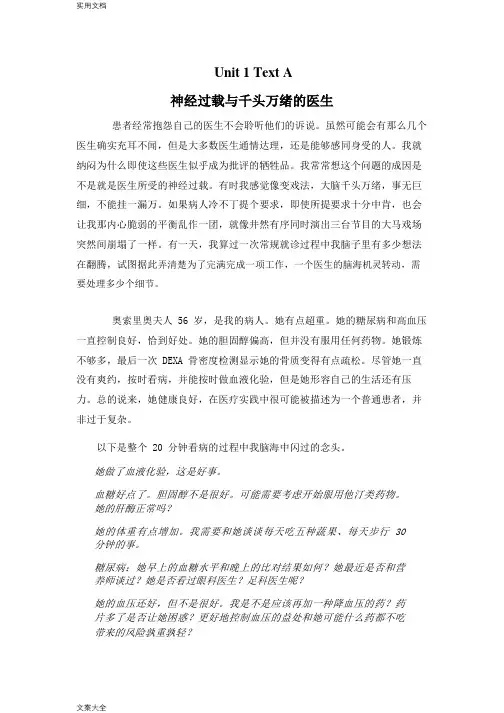
Unit 1 Text A神经过载与千头万绪的医生患者经常抱怨自己的医生不会聆听他们的诉说。
虽然可能会有那么几个医生确实充耳不闻,但是大多数医生通情达理,还是能够感同身受的人。
我就纳闷为什么即使这些医生似乎成为批评的牺牲品。
我常常想这个问题的成因是不是就是医生所受的神经过载。
有时我感觉像变戏法,大脑千头万绪,事无巨细,不能挂一漏万。
如果病人冷不丁提个要求,即使所提要求十分中肯,也会让我那内心脆弱的平衡乱作一团,就像井然有序同时演出三台节目的大马戏场突然间崩塌了一样。
有一天,我算过一次常规就诊过程中我脑子里有多少想法在翻腾,试图据此弄清楚为了完满完成一项工作,一个医生的脑海机灵转动,需要处理多少个细节。
奥索里奥夫人 56 岁,是我的病人。
她有点超重。
她的糖尿病和高血压一直控制良好,恰到好处。
她的胆固醇偏高,但并没有服用任何药物。
她锻炼不够多,最后一次 DEXA 骨密度检测显示她的骨质变得有点疏松。
尽管她一直没有爽约,按时看病,并能按时做血液化验,但是她形容自己的生活还有压力。
总的说来,她健康良好,在医疗实践中很可能被描述为一个普通患者,并非过于复杂。
以下是整个 20 分钟看病的过程中我脑海中闪过的念头。
她做了血液化验,这是好事。
血糖好点了。
胆固醇不是很好。
可能需要考虑开始服用他汀类药物。
她的肝酶正常吗?她的体重有点增加。
我需要和她谈谈每天吃五种蔬果、每天步行 30 分钟的事。
糖尿病:她早上的血糖水平和晚上的比对结果如何?她最近是否和营养师谈过?她是否看过眼科医生?足科医生呢?她的血压还好,但不是很好。
我是不是应该再加一种降血压的药?药片多了是否让她困惑?更好地控制血压的益处和她可能什么药都不吃带来的风险孰重孰轻?骨密度 DEXA 扫描显示她的骨质有点疏松。
我是否应该让她服用二磷酸盐,因为这可以预防骨质疏松症?而我现在又要给她加一种药丸,而这种药需要详细说明。
也许留到下一次再说吧?她家里的情况怎么样呢?她现在是否有常见的生活压力?亦或她有可能有抑郁症或焦虑症?有没有时间让她做个抑郁问卷调查呢?健康保养:她最后一次乳房 X 光检查是什么时候做的?子宫颈抹片呢? 50 岁之后是否做过结肠镜检查?过去 10 年间她是否注射过破伤风加强疫苗?她是否符合接种肺炎疫苗的条件?奥索里奥夫人打断了我的思路,告诉我过去的几个月里她一直背痛。
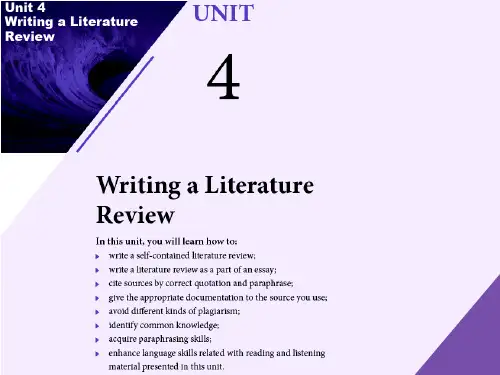
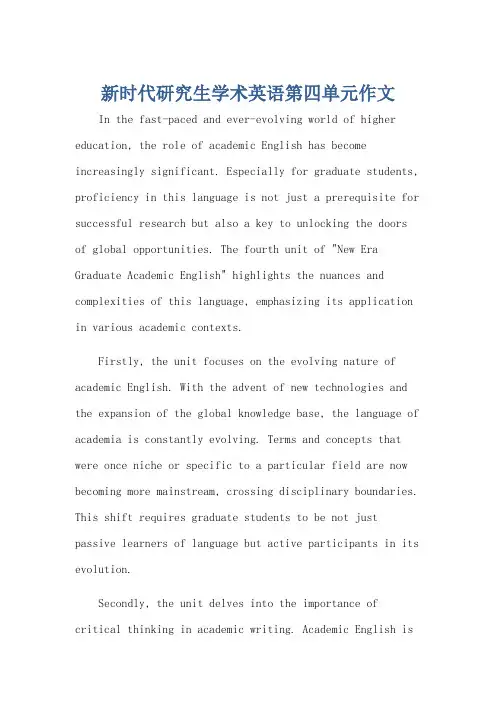
新时代研究生学术英语第四单元作文In the fast-paced and ever-evolving world of higher education, the role of academic English has become increasingly significant. Especially for graduate students, proficiency in this language is not just a prerequisite for successful research but also a key to unlocking the doors of global opportunities. The fourth unit of "New Era Graduate Academic English" highlights the nuances and complexities of this language, emphasizing its application in various academic contexts.Firstly, the unit focuses on the evolving nature of academic English. With the advent of new technologies and the expansion of the global knowledge base, the language of academia is constantly evolving. Terms and concepts that were once niche or specific to a particular field are now becoming more mainstream, crossing disciplinary boundaries. This shift requires graduate students to be not just passive learners of language but active participants in its evolution.Secondly, the unit delves into the importance ofcritical thinking in academic writing. Academic English isnot just about grammar and vocabulary; it's about expressing ideas clearly, critically, and persuasively. Graduate students are expected to analyze complex issues, synthesize information from multiple sources, and present their findings in a coherent and logical manner. This requires a high level of critical thinking skills, which the unit helps develop through various exercises and assignments.Moreover, the unit emphasizes the role of cultural awareness in academic communication. Academic English is not just a language; it's a cultural construct. Understanding the cultural backgrounds and contexts of different academic communities is crucial for effective communication. Graduate students need to be aware of the nuances of academic writing in different cultures, from the choice of words to the structure of arguments.Lastly, the unit covers the practical application of academic English in research papers and presentations. It provides guidelines on how to structure a research paper, choose appropriate language, and present findings effectively. This is invaluable for graduate students whoare embarking on their research journeys and aim to publish their work in international journals or present their research at international conferences.In conclusion, the fourth unit of "New Era Graduate Academic English" provides a comprehensive and holistic approach to academic writing. It equips graduate students with the language skills, critical thinking abilities, and cultural awareness necessary for success in the global academic arena. By mastering these skills, graduatestudents can not only excel in their academic careers but also contribute to the evolving narrative of academic English in the new era.**新时代研究生学术英语的演变:研究生的视角**在高等教育快速变革和发展的世界中,学术英语的作用变得日益重要。
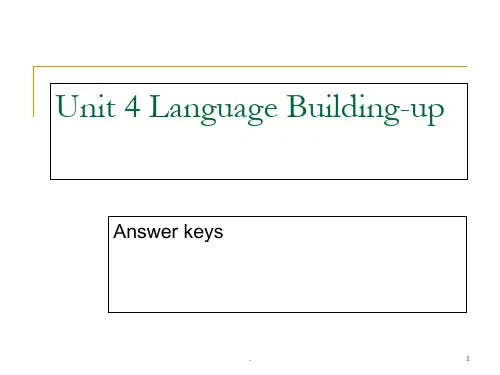
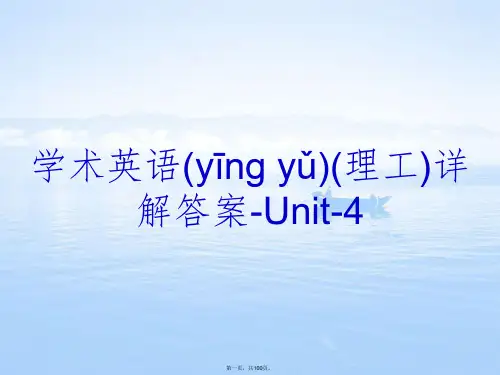
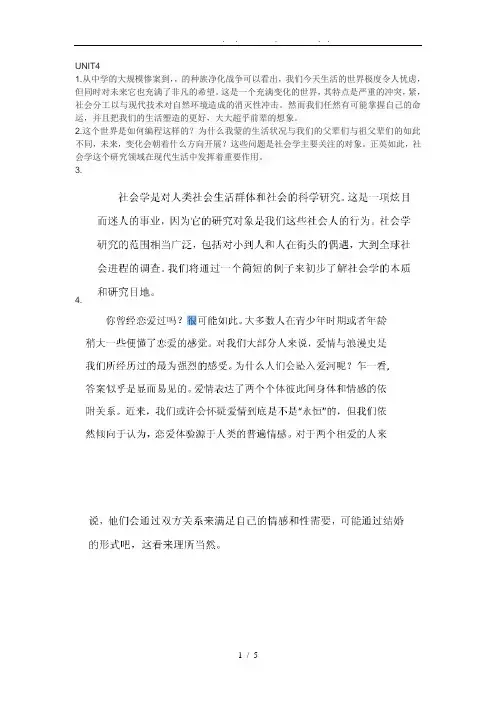
UNIT4
1.从中学的大规模惨案到,,的种族净化战争可以看出,我们今天生活的世界极度令人忧虑,但同时对未来它也充满了非凡的希望。
这是一个充满变化的世界,其特点是严重的冲突,紧,社会分工以与现代技术对自然环境造成的消灭性冲击。
然而我们任然有可能掌握自己的命运,并且把我们的生活塑造的更好,大大超乎前辈的想象。
2.这个世界是如何编程这样的?为什么我蒙的生活状况与我们的父辈们与祖父辈们的如此不同,未来,变化会朝着什么方向开展?这些问题是社会学主要关注的对象。
正英如此,社会学这个研究领域在现代生活中发挥着重要作用。
3.
4.
5.6 7
8
9 10
12。
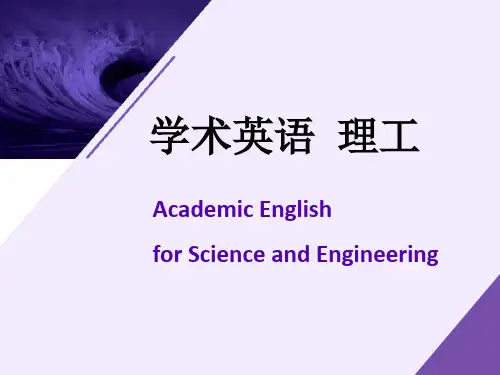
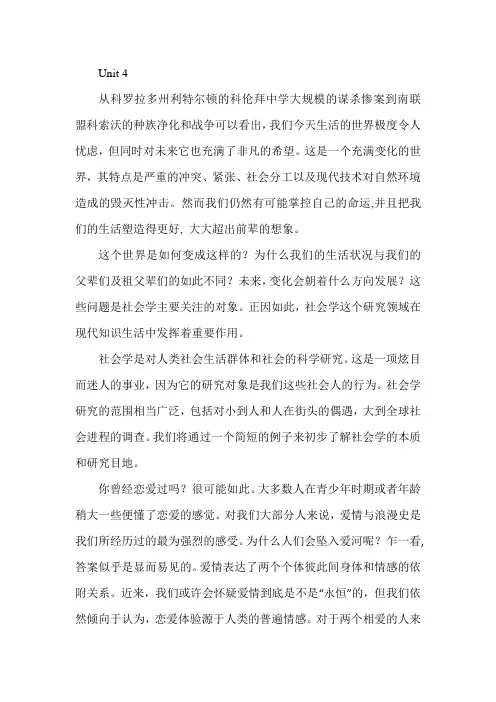
Unit 4从科罗拉多州利特尔顿的科伦拜中学大规模的谋杀惨案到南联盟科索沃的种族净化和战争可以看出,我们今天生活的世界极度令人忧虑,但同时对未来它也充满了非凡的希望。
这是一个充满变化的世界,其特点是严重的冲突、紧张、社会分工以及现代技术对自然环境造成的毁灭性冲击。
然而我们仍然有可能掌控自己的命运,并且把我们的生活塑造得更好, 大大超出前辈的想象。
这个世界是如何变成这样的?为什么我们的生活状况与我们的父辈们及祖父辈们的如此不同?未来,变化会朝着什么方向发展?这些问题是社会学主要关注的对象。
正因如此,社会学这个研究领域在现代知识生活中发挥着重要作用。
社会学是对人类社会生活群体和社会的科学研究。
这是一项炫目而迷人的事业,因为它的研究对象是我们这些社会人的行为。
社会学研究的范围相当广泛,包括对小到人和人在街头的偶遇,大到全球社会进程的调查。
我们将通过一个简短的例子来初步了解社会学的本质和研究目地。
你曾经恋爱过吗?很可能如此。
大多数人在青少年时期或者年龄稍大一些便懂了恋爱的感觉。
对我们大部分人来说,爱情与浪漫史是我们所经历过的最为强烈的感受。
为什么人们会坠入爱河呢?乍一看,答案似乎是显而易见的。
爱情表达了两个个体彼此间身体和情感的依附关系。
近来,我们或许会怀疑爱情到底是不是“永恒”的,但我们依然倾向于认为,恋爱体验源于人类的普遍情感。
对于两个相爱的人来说,他们会通过双方关系来满足自己的情感和性需要,可能通过结婚的形式吧,这看来理所当然。
然而,如今在我们看来似乎是不言自明的这种情况,事实上非常少见。
世上不是所有的人都会有恋爱这种经历,在它确实发生时,我们也很少将它和婚姻联系起来。
在我们的社会中,浪漫爱情这一观念直到最近才开始变得普遍,而在其他大部分文化中从未出现过。
只有现代社会才将爱情和性视做是密切相关之事。
在中世纪以及随后的几个世纪中,男人和女人结婚的目的就是为了保住家业, 或者养育孩子来经营家庭农场。
一旦结婚,他们可能会变成亲密的伴侣;然而,这种情况发生在婚后,而不是婚前。
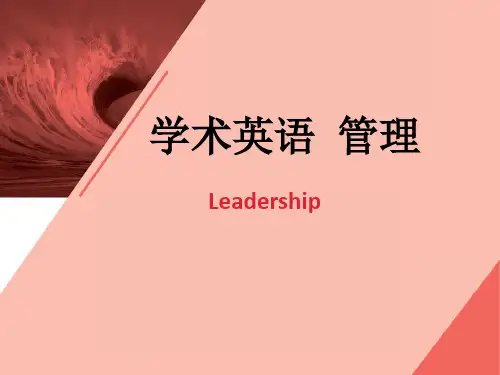
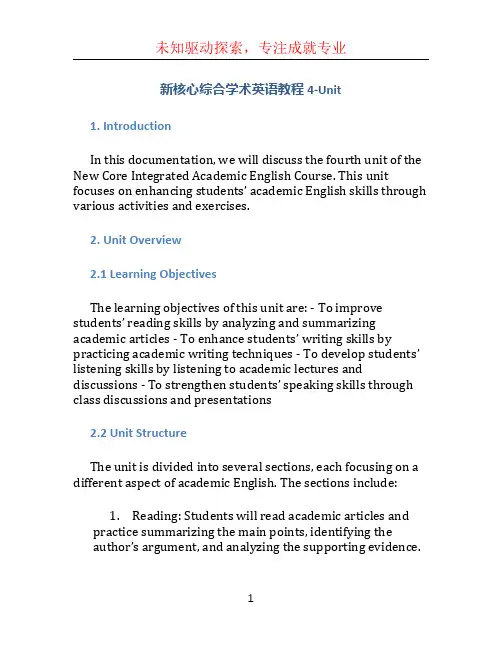
新核心综合学术英语教程4-Unit1. IntroductionIn this documentation, we will discuss the fourth unit of the New Core Integrated Academic English Course. This unit focuses on enhancing students’ academic English skills through various activities and exercises.2. Unit Overview2.1 Learning ObjectivesThe learning objectives of this unit are: - To improve students’ reading skills by analyzing and summarizing academic articles - To enhance students’ writing skills by practicing academic writing techniques - To develop st udents’ listening skills by listening to academic lectures and discussions - To strengthen students’ speaking skills through class discussions and presentations2.2 Unit StructureThe unit is divided into several sections, each focusing on a different aspect of academic English. The sections include:1.Reading: Students will read academic articles andpractice summarizing the main points, identifying theauthor’s argument, and analyzing the supporting evidence.2.Writing: Students will practice writing academic essays, focusing on proper structure, coherence, and supporting evidence. They will also learn about different citation styles.3.Listening: Students will listen to academic lectures and discussions and take notes. They will practice understanding academic vocabulary and identifying main ideas.4.Speaking: Students will participate in class discussions and debates on various academic topics. They will also deliver presentations on research topics of their choice.3. Activities and Exercises3.1 Reading Activities•Reading and summarizing academic articles•Analyzing the author’s arguments and identifying supporting evidence•Discussing the main ideas and implications of the articles3.2 Writing Activities•Writing academic essays on given topics•Incorporating proper citation and referencing techniques•Peer reviewing and providing feedback on classmates’ essays3.3 Listening Activities•Listening to academic lectures and taking notes•Identifying key terms and phrases•Discussing the main ideas and implications of the lectures3.4 Speaking Activities•Participating in class discussions and debates on academic topics•Delivering presentations on research topics•Providing constructive feedback to peers’ presentations4. Additional ResourcesIn addition to the main textbook, there are several supplementary resources that students can utilize to further enhance their academic English skills. These include:•Online academic journals and articles for further reading and analysis•Academic writing guides and handbooks for reference•Online resources for practicing listening comprehension skills, such as TED Talks and academicpodcasts5. ConclusionThe fourth unit of the New Core Integrated Academic English Course provides students with a comprehensive learning experience in academic English. Through various activities and exercises, students will improve their reading, writing, listening, and speaking skills. With access to additional resources, students can further enhance their understanding and proficiency in academic English.。
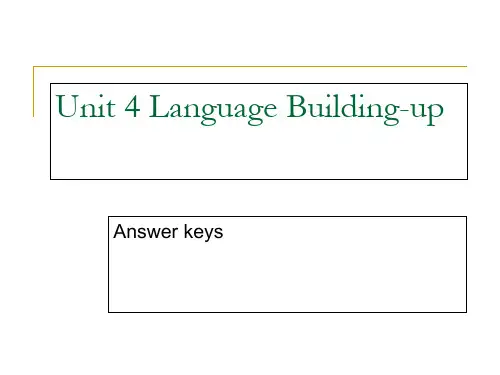
新时代研究生学术英语教程1第四单元New Era Research English Course for Postgraduates Unit 1In recent years, the importance of academic English skills for postgraduates has been widely recognized. As the world becomes increasingly interconnected and the demand for English proficiency grows, it is crucial for graduate students to develop strong academic English abilities. In this regard, "New Era Research English Course for Postgraduates" serves as an essential tool in enhancing students' academic English skills. This article aims to provide an overview of the fourth unit of this course and its significance in the era of globalization.Unit 4: Academic WritingThe fourth unit of the "New Era Research English Course for Postgraduates" focuses on academic writing. Academic writing is a fundamental skill that postgraduate students need to master in order to effectively communicate their research findings and contribute to their respective fields. This unit offers a comprehensive guide on how to write academic papers, including structuring an argument, conducting literature reviews, and citing sources appropriately.1. Structuring an ArgumentOne of the key elements of academic writing is the ability to structure a clear and coherent argument. In this unit, students will learn the importance of developing a strong thesis statement and organizing their ideas in a logical manner. They will also be introduced to various types of argumentstructures, such as deductive reasoning and inductive reasoning, and how to apply them in their own writing.2. Conducting Literature ReviewsA literature review is an essential part of any academic paper. It allows researchers to situate their work within the existing body of knowledge and identify gaps that can be addressed by their own research. In this unit, students will learn how to effectively search for relevant literature, critically analyze previous studies, and synthesize the information gathered to support their own arguments.3. Citing Sources AppropriatelyProper citation is crucial in academic writing to acknowledge the contributions of other researchers and avoid plagiarism. This unit provides guidelines on how to cite sources using commonly used citation styles, such as APA and MLA. Students will learn how to create in-text citations, compile a reference list, and format their citations according to specific guidelines.4. Writing Coherent Paragraphs and SentencesIn addition to overall argument structure, this unit also emphasizes the importance of writing coherent paragraphs and sentences. Students will learn how to develop topic sentences, provide supporting evidence, and use appropriate transition words to ensure smooth flow and cohesion in their writing. They will also be introduced to techniques for improving sentence clarity and avoiding common grammatical errors.ConclusionThe fourth unit of the "New Era Research English Course for Postgraduates" provides comprehensive guidance on academic writing skills, which are essential for postgraduate students in the era of globalization. By mastering the techniques and strategies taught in this unit, students will be equipped with the necessary tools to effectively communicate their research findings and contribute to their respective fields. With its focus on structuring arguments, conducting literature reviews, citing sources appropriately, and writing coherent paragraphs and sentences, this unit plays a vital role in developing students' academic English proficiency.。
Unit 4 Describing MethodologyObjectives─ Be clear about t he significance of this section─ Try to understand the importance of pa ssive voice in academic writing─ Learn to be skilled in using sequential markers in writing a pro cess─ Be fam iliar with proof-reading skills─ Learn to design a questionnaireContents─ Brief introduction to this section─ Reading & Discussion: What information elements are usually involved in writing a methodology section?─ Language Focus: Passive voice and sequential markers─ Writing Practice: Understanding the sentence patterns and sent ence order in writing a process─ Writing Project: How to design a questionnaire1.Reading ActivityIn natural sciences the method section is often called Materials and Methods. In social sciences it is common to introduce a section called Theory and Methods. Sometimes it is divided in two sections: Theoretical Framework and Methods.Research methodology is mainly concerned with the answers to the following questions:1) Why is a particular research study undertaken?2) How has one formulated a research problem?3) What types of data have been collected?4) What particular methods have been used?5) Why is a particular technique of analysis of data used?1.1Pre-reading TaskThe following is the method section of a research article in the field of applied linguistics. Think about the following questions before reading the text and then havea discussion with your classmates:1) What is the function of the method section?2) What information elements does a method section include?3) What verb tenses are mainly used in the text? What is the proportion of activevoice verbs to passive voice verbs in this method section?1.2 Reading PassageEnglish for College Students in Taiwan:A Study of perceptions of English Needs in a Medical ContextThe experiment was initiated to investigate perceptions of English needs in a medical context among college students in Taiwan.The subjects were 341 medical students in the Department of Medicine, including 97 freshmen, 74 sophomores, 90 juniors, and 80 seniors, and 20 faculty members in the medical program at Chung Shan Medical College in Taichung, Taiwan, China.Two questionnaires were developed for the survey, based on two earlier survey instruments by Taylor & Hussein (1985) and Guo (1989). The questionnaires were translated into Chinese, piloted, and modified according to the feedback from l0 respondents: six medical students and four faculty members from Chung Shan Medical College. The questionnaire given to the medical students consisted of five sections of 23 questions, the topics of which were the importance of English incollege and professional careers, perceived language skill needs and problems, the activities needed in a freshman language course, and suggestions for development of course content and materials as well as demographic information. The faculty questionnaire consisted of four sections of l6 questions, which were parallel to those in the version given to the students except no demographic information was gathered (see Appendix).One of the authors, a faculty member at Chung Shan Medical College, selected one required class for each group of students (freshmen sophomores, juniors and seniors). Copies of the student questionnaire for administration to the students were then sent to cooperating instructors teaching these courses; copies of the faculty questionnaire were given to 20 teachers who were willing to complete the survey.The data were computer-analyzed using an SPSS program: in the questionnaire, percentages were determined for all questions except 8 and 13 for which means were computed. Chi-square, t-tests, and ANOV A analyses (方差分析) were conducted in order to determine the perceptions of English language needs of medical college students and their faculty and to compare the perceptions held by the various groups.( Pang, 2008)1.3 Reading Comprehension1.3.1 Fill in the following table with relevant details from the passage.1.3.2 Understand more about the method section of this research. Whatdo you know about the questionnaires used in the survey?2. Language Focus2.1 Passive voiceThe passive voice is usually used in academic writing, because passive structures have less subjective coloring in most cases than active ones. When describing a process or a scientific experiment, it is important to write in a neutral style, as an observer. To do this, you can use passive voice. There are three instances in which the passive voice is recommended: 1) when we do not know or do not care about who has performed the action; 2) when we focus on the receiver instead of the performer of the action; and 3) when we would like to remain in a neutral or objective position in writing. More examples from the methodology section are as follows:1) The study was conducted at the beginning of the semester and the final one was given at the end of the semester. ( procedure )2) In summer, the greenhouse was cooled by pulling in air through water saturated pads on the south end of the building. ( specially designed material )3) The quartz reactors tested for this work are fabricated by the A&B Sales Company of Wheeling, Leeds, UK. ( instrument )4) In order to provide a broad sampling of college students, respondents were recruited from diverse fields of study. ( sampling )5) The final scores were computed into mean averages (X) and standard deviations (SD). ( statistical analysis)2.1.1 Go over the Reading Passage and mark verbs inthe passive voiceand then complete the following table:2.1.2 Rewrite the following text with passive voice.Some people consider a poison ivy infection to be humorous. But it is not funny at all. Contact with the plant causes a rash that has the intensity of a fresh mosquito bite and lasts for several days. Scientists have studied poison ivy infection for centuries, but they have found no preventive pill or inoculation. The poisonous substance in the plant is called urushiol. After urushiol has touched the skin, blisters and weeping sores will soon cover the exposed area.2.2 Sequential markersA process paragraph explains how to do something or how something works. Process paragraphs are usually developed step-by-step in a chronological or logical sequence. The following sequencing expressions are more frequently used to link steps in a description of a process or to divide a process into steps:● Firstly … To begin with … First of all … etc.● Secondly … Next … After that … In addition … etc.● Finally … Lastly …The following sentences describe a process of making paper. Use sequential words and rewrite them into a cohesive paragraph.1) The logs are placed in the shredder.2) They are cut into small chips and mixed with water and acid.3) They are heated and crushed to a heavy pulp which is cleaned.4) It is chemically bleached to whiten it.5) It is passed through rollers to flatten it.6). Sheets of wet paper are produced.7) The water is removed from the sheets which are pressed, dried and refined and the finished paper is produced.3. Writing PracticeA well organized, logically ordered and easily understandable chapter on methodology makes the thesis a really outstanding work. Normally, a method section includes:1) Overview of the experiment: one sentence briefly tells what was done (like a topicsentence);2) Population: state the people/subjects studied, or the things tested;3) Location : where the study took place;4) Restriction/Limiting conditions: precautions taken to make sure that the data are valid;5) Sampling Techniques : describe how the subject are selected for the study;6) Materials : describe the materials used to conduct the study or experiment;7) Procedures : State the steps of the experiment in a chronological order;8) Statistical Treatment: describe how the statistics are examined.Of all the items on this list, the only items that are always included in the method section are the materials and procedures.3.1 Read the following sentences. They are all taken from method sections from different research articles. In each case, determine which information element is represented.(1) A total of 369 participants of European origins (52.7% female) with a mean age of27.2 years were recruited by research assistants in public places in the Montrealregion.(2) The data used for the current analysis consists of 60 texts taken from 20engineering journals.(3) Experimenters approached potential participants by introducing themselves asstudents from the University of Quebec in Montreal and then asked if they would accept to participate in a short study on facial expressions.(4) The study aims to examine the use of SEF as a tool for providing evidence ofteaching effectiveness in tertiary education.(5) The results of the two questionnaires were subjected to statistical tests ofreliability and significance using SPSS.(6) Envelopes containing the survey materials were sent to the local business managerof each union. In the envelopes, there was a cover letter explaining the project, the questionnaire itself, and a pre-paid return envelope. The union business manager was contacted and asked to select workers from his union and to send the envelopes to the chosen workers.(7) The participants were 90 first-year students from the School of Foreign Languagesat a major university in Nanjing. Their average age was 18 years old. They constituted a convenience sample.(8) The investigation was performed in a national laboratory affiliated to a researchcenter for industrial automation in Nanjing, Jiangsu Province.3.2 Completing sentencesThe following words and phrasal verbs are more commonly used in Method SectionComplete the following paragraph by translating Chinese into English.A group of MBA students from a major metropolitan state university were recruited as participants for the investigation. (1)(问卷调查实施)after the topic of the BSC had been discussed in the course. 136 students enrolled in a managerial accounting course ( 2 ) (完成了此次问卷. _( 3 )_(表2给出了这些参与者的背景信息). As is shown, the majority of participants are male. _( 4 )_(参与者的平均年龄约29岁), _( 5 )_(平均工作经历约6年), and the mean number of accounting classes was approximately four.(Liu, 2008)1)_________________________________________________________________2)_________________________________________________________________3)_________________________________________________________________4)_________________________________________________________________5)_________________________________________________________________3.3 Reordering sentencesThe following is the method section of a research article from the field of engineering with sentences in a scrambled order. Please rearrange them in a more conventional order. Write the sequential number in the box on the right side of the table below.3.4 Rewriting sentencesThe following sentences are taken from method sections of different published articles. Rewrite each sentence to make it more acceptable.(1) Table 5 shows the number of students per level and their L1 language backgroundswhich are represented.__________________________________________________________________ (2) Two questionnaires which were administered respectively to the personnel officersand business employees show a similar result in terms of their perception of the use of English in their firm.__________________________________________________________________ __________________________________________________________________ (3) The scores of the two raters were averaged and all the data were entered forstatistical analysis._________________________________________________________________ _________________________________________________________________ (4) The model which was used in the experiment was a modified version of the 2006Test package, which was originally developed by the Morrison Research Institute._________________________________________________________________ _________________________________________________________________ (5) Gray (1998) studied the effectiveness of the new schedule. He used scores on theStanford Achievement Test as the measure.__________________________________________________________________ __________________________________________________________________ (6) Having explained the directions, the students began to write.__________________________________________________________________ __________________________________________________________________ (7) The schedule was in effect only 1 year, with students achieving better results.__________________________________________________________________ (8) The teacher put the assignment on the board, and then she checked the roll andfound that three students were absent.__________________________________________________________________ __________________________________________________________________(9) School administrators who are interested in making changes that are not tooexpensive or too complex for the most part have been overly receptive to simplistic solutions.__________________________________________________________________ __________________________________________________________________ __________________________________________________________________ (10) One of the obstacles that deter the installation of solar energy systems that aredesigned to achieve the savings that are important to all people is the reluctance of those same individuals to make large capital investments.__________________________________________________________________ __________________________________________________________________ __________________________________________________________________3.5 Turning notes into a passageYou are required to write the method section of a research paper about the experiment to investigate into students’ preferences and attitudes towards sugar-sweetened and artificially-sweetened beverages. Pay particular attention to the choice of tense and voice.4. Writing Project4.1 Gathering information for a method section.You are required to write the method section of a research paper in the field of English language class attendance with the information elements given below. Gather information for your research.4.2 Designing a questionnaireThe design of a questionnaire will depend on whether the researcher wishes to collect exploratory information (i.e. qualitative information for the purposes of better understanding or the generation of hypotheses on a subject) or quantitative information (to test specific hypotheses that have previously been generated).A good questionnaire is one that: 1) enables collection of accurate data in a timely manner; 2) facilitates the work of data collection, data processing and the tabulation of data; 3) ensures that there is no collection of non-essential information; and 4) permits comprehensive and meaningful analysis as well as purposeful utilization of the data collected to ensure that the technical task of the questionnaire receives the various input that it requires.Types of questionsThere are many different types of questions you can use to get the information that you need. In the main, these fall into open and closed questions. An open question allows the respondents to use their own words to answer, e. g., “What do you think are the main causes of racism?” A closed question gives them pre-defined options, e.g., “Which of the following do you think are the main causes of racism: a, b, c, d”.The pros and cons of each are given in the following table.Rating design in a questionnaire: Look closely at the following example of a rating design.Please rate the quality of the medical insurance of this company.□Poor □Fair □GoodThere are nine steps involved in the development of a questionnaire:1. Decide the information required;2. Define the target respondents;3. Choose the method(s) of reaching your target respondents;4. Decide on question content;5. Develop the question wording;6. Put questions into a meaningful order and format;7. Check the length of the questionnaire;8. Pre-test the questionnaire;9. Develop the final survey form.Now work in groups of four, and design a questionnaire to obtain information about students’ attendance and causes for their absence.4.3 Drafting your method sectionBegin your writing now with the information you have just obtained from your survey.5. Final ChecklistRevision gives you an opportunity to take another look at what you have written. Therefore, you have to do some extra work to revise your draft. Here are some general rules for your check.。
Unit 4 Describing MethodologyObjectives─ Be clear about the significance of this section─ Try to understand the importance of passive voice in academic writing─ Learn to be skilled in using sequential markers in writing a process─ Be familiar with proof-reading skills─ Learn to design a questionnaireContents─ Brief introduction to this section─ Reading & Discussion: What information elements are usually involved in writing a methodology section?─ Language Focus: Passive voice and sequential markers─ Writing Practice: Understanding the sentence patterns and sentence order in writing a process─ Writing Project: How to design a questionnaire1.Reading ActivityIn natural sciences the method section is often called Materials and Methods. In social sciences it is common to introduce a section called Theory and Methods. Sometimes it is divided in two sections: Theoretical Framework and Methods.Research methodology is mainly concerned with the answers to the following questions:1) Why is a particular research study undertaken?2) How has one formulated a research problem?3) What types of data have been collected?4) What particular methods have been used?5) Why is a particular technique of analysis of data used?1.1Pre-reading TaskThe following is the method section of a research article in the field of applied linguistics. Think about the following questions before reading the text and then havea discussion with your classmates:1) What is the function of the method section?2) What information elements does a method section include?3) What verb tenses are mainly used in the text? What is the proportion of activevoice verbs to passive voice verbs in this method section?1.2 Reading PassageEnglish for College Students in Taiwan:A Study of perceptions of English Needs in a Medical ContextThe experiment was initiated to investigate perceptions of English needs in a medical context among college students in Taiwan.The subjects were 341 medical students in the Department of Medicine, including 97 freshmen, 74 sophomores, 90 juniors, and 80 seniors, and 20 faculty members in the medical program at Chung Shan Medical College in Taichung, Taiwan, China.Two questionnaires were developed for the survey, based on two earlier survey instruments by Taylor & Hussein (1985) and Guo (1989). The questionnaires were translated into Chinese, piloted, and modified according to the feedback from l0 respondents: six medical students and four faculty members from Chung Shan Medical College. The questionnaire given to the medical students consisted of five sections of 23 questions, the topics of which were the importance of English incollege and professional careers, perceived language skill needs and problems, the activities needed in a freshman language course, and suggestions for development of course content and materials as well as demographic information. The faculty questionnaire consisted of four sections of l6 questions, which were parallel to those in the version given to the students except no demographic information was gathered (see Appendix).One of the authors, a faculty member at Chung Shan Medical College, selected one required class for each group of students (freshmen sophomores, juniors and seniors). Copies of the student questionnaire for administration to the students were then sent to cooperating instructors teaching these courses; copies of the faculty questionnaire were given to 20 teachers who were willing to complete the survey.The data were computer-analyzed using an SPSS program: in the questionnaire, percentages were determined for all questions except 8 and 13 for which means were computed. Chi-square, t-tests, and ANOVA analyses (方差分析) were conducted in order to determine the perceptions of English language needs of medical college students and their faculty and to compare the perceptions held by the various groups.( Pang, 2008)1.3 Reading Comprehension1.3.1 Fill in the following table with relevant details from the passage. Research objectiveResearch subjectsResearch locationMaterialsProcedureStatistical analysis1.3.2 Understand more about the method section of this research. Whatdo you know about the questionnaires used in the survey?2. Language Focus2.1 Passive voiceThe passive voice is usually used in academic writing, because passive structures have less subjective coloring in most cases than active ones. When describing a process or a scientific experiment, it is important to write in a neutral style, as an observer. To do this, you can use passive voice. There are three instances in which the passive voice is recommended: 1) when we do not know or do not care about who has performed the action; 2) when we focus on the receiver instead of the performer of the action; and 3) when we would like to remain in a neutral or objective position in writing. More examples from the methodology section are as follows:1) The study was conducted at the beginning of the semester and the final one was given at the end of the semester. ( procedure )2) In summer, the greenhouse was cooled by pulling in air through water saturated pads on the south end of the building. ( specially designed material )3) The quartz reactors tested for this work are fabricated by the A&B Sales Company of Wheeling, Leeds, UK. ( instrument )4) In order to provide a broad sampling of college students, respondents were recruited from diverse fields of study. ( sampling )5) The final scores were computed into mean averages (X) and standard deviations (SD). ( statistical analysis)2.1.1 Go over the Reading Passage and mark verbs in the passive voiceand then complete the following table:2.1.2 Rewrite the following text with passive voice.Some people consider a poison ivy infection to be humorous. But it is not funny at all. Contact with the plant causes a rash that has the intensity of a fresh mosquito bite and lasts for several days. Scientists have studied poison ivy infection for centuries, but they have found no preventive pill or inoculation. The poisonous substance in the plant is called urushiol. After urushiol has touched the skin, blisters and weeping sores will soon cover the exposed area.2.2 Sequential markersA process paragraph explains how to do something or how something works. Process paragraphs are usually developed step-by-step in a chronological or logical sequence. The following sequencing expressions are more frequently used to link steps in a description of a process or to divide a process into steps:● Firstly … To begin with … First of all … etc.● Secondly … Next … After that … In addition … etc.● Finally … Lastly …The following sentences describe a process of making paper. Use sequential words and rewrite them into a cohesive paragraph.1) The logs are placed in the shredder.2) They are cut into small chips and mixed with water and acid.3) They are heated and crushed to a heavy pulp which is cleaned.4) It is chemically bleached to whiten it.5) It is passed through rollers to flatten it.6). Sheets of wet paper are produced.7) The water is removed from the sheets which are pressed, dried and refined and the finished paper is produced.3. Writing PracticeA well organized, logically ordered and easily understandable chapter on methodology makes the thesis a really outstanding work. Normally, a method section includes:1) Overview of the experiment: one sentence briefly tells what was done (like a topicsentence);2) Population: state the people/subjects studied, or the things tested;3) Location : where the study took place;4) Restriction/Limiting conditions: precautions taken to make sure that the data are valid;5) Sampling Techniques : describe how the subject are selected for the study;6) Materials : describe the materials used to conduct the study or experiment;7) Procedures : State the steps of the experiment in a chronological order;8) Statistical Treatment: describe how the statistics are examined.Of all the items on this list, the only items that are always included in the method section are the materials and procedures.3.1 Read the following sentences. They are all taken from method sections from different research articles. In each case, determine which information element is represented.(1) A total of 369 participants of European origins (52.7% female) with a mean age of27.2 years were recruited by research assistants in public places in the Montrealregion.(2) The data used for the current analysis consists of 60 texts taken from 20engineering journals.(3) Experimenters approached potential participants by introducing themselves asstudents from the University of Quebec in Montreal and then asked if they would accept to participate in a short study on facial expressions.(4) The study aims to examine the use of SEF as a tool for providing evidence ofteaching effectiveness in tertiary education.(5) The results of the two questionnaires were subjected to statistical tests ofreliability and significance using SPSS.(6) Envelopes containing the survey materials were sent to the local business managerof each union. In the envelopes, there was a cover letter explaining the project, the questionnaire itself, and a pre-paid return envelope. The union business manager was contacted and asked to select workers from his union and to send the envelopes to the chosen workers.(7) The participants were 90 first-year students from the School of Foreign Languagesat a major university in Nanjing. Their average age was 18 years old. They constituted a convenience sample.(8) The investigation was performed in a national laboratory affiliated to a researchcenter for industrial automation in Nanjing, Jiangsu Province.3.2 Completing sentencesThe following words and phrasal verbs are more commonly used in Method Section Subjects / participants choose, include, recruit,volunteered / paid to participate, …Materials be composed of, be located, be installed,be equipped with, obtain, supply, …Research designapply, employ, develop, resort to, use, …Procedurecarry out, follow, perform, propose, …Complete the following paragraph by translating Chinese into English.A group of MBA students from a major metropolitan state university were recruited as participants for the investigation. (1)(问卷调查实施)after the topic of the BSC had been discussed in the course. 136 students enrolled in a managerial accounting course ( 2 ) (完成了此次问卷. _( 3 )_(表2给出了这些参与者的背景信息). As is shown, the majority of participants are male. _( 4 ) _(参与者的平均年龄约29岁), _( 5 )_(平均工作经历约6年), and the mean number of accounting classes was approximately four.(Liu, 2008)1)_________________________________________________________________2)_________________________________________________________________3)_________________________________________________________________4)_________________________________________________________________5)_________________________________________________________________3.3 Reordering sentencesThe following is the method section of a research article from the field of engineering with sentences in a scrambled order. Please rearrange them in a more conventional order. Write the sequential number in the box on the right side of the table below.a The data was rank-ordered from the lowest X value of 1.2 tothe highest of 3.8--- see Table 2 below.b The SD scores show to what extent the teachers agreedamong themselves when judging the gravity of each error.c The survey was conducted by means of a questionnaire, inwhich the errors appeared in a random order.d The assessors were instructed to view each error in itscontext and determine to what extent it deviated fromnormal English.e The questionnaire included the context in which each errorhad occurred and a marking scale ranging from 0 for "noerror” to 5 for “the most severe error".f After scoring, the assessors were given the option to writedown the principles that guided them in their scoring.g The scores were computed into mean averages (X) andstandard deviations (SD).h Unless otherwise indicated, the numerical data in the textrefer to the mean average scores.i The higher the SD score, the more diverse the assessors'opinions regarding the gravity of the item.3.4 Rewriting sentencesThe following sentences are taken from method sections of different published articles. Rewrite each sentence to make it more acceptable.(1) Table 5 shows the number of students per level and their L1 languagebackgrounds which are represented.__________________________________________________________________(2) Two questionnaires which were administered respectively to the personnel officersand business employees show a similar result in terms of their perception of the use of English in their firm.__________________________________________________________________ __________________________________________________________________ (3) The scores of the two raters were averaged and all the data were entered forstatistical analysis._________________________________________________________________ _________________________________________________________________ (4) The model which was used in the experiment was a modified version of the 2006Test package, which was originally developed by the Morrison Research Institute._________________________________________________________________ _________________________________________________________________ (5) Gray (1998) studied the effectiveness of the new schedule. He used scores on theStanford Achievement Test as the measure.__________________________________________________________________ __________________________________________________________________ (6) Having explained the directions, the students began to write.__________________________________________________________________ __________________________________________________________________ (7) The schedule was in effect only 1 year, with students achieving better results.__________________________________________________________________ (8) The teacher put the assignment on the board, and then she checked the roll andfound that three students were absent.____________________________________________________________________________________________________________________________________ (9) School administrators who are interested in making changes that are not tooexpensive or too complex for the most part have been overly receptive to simplistic solutions.__________________________________________________________________ __________________________________________________________________ __________________________________________________________________ (10) One of the obstacles that deter the installation of solar energy systems that aredesigned to achieve the savings that are important to all people is the reluctance of those same individuals to make large capital investments.__________________________________________________________________ __________________________________________________________________ __________________________________________________________________3.5 Turning notes into a passageYou are required to write the method section of a research paper about the experiment to investigate into students’ preferences and attitudes towards sugar-sweetened and artificially-sweetened beverages. Pay particular attention to the choice of tense and voice.Aim of research To determine student’s preferences and attitudestoward sugar-sweetened and artificially-sweetenedbeverages.Research subjects Ten people, five male and five female students, froma Science English class 1, chosen at random Materials Thirty straws, two cups, one blindfold, and twocontainers of Kool-Aid, a popular drink in the UnitedStates, one container with four cups of orange Kool-Aid sweetened with one half cup of sugar, the othercontainer with four cups of orange Kool-aidsweetened with 9 packets of Nutrasweet brandartificial sweetener.Procedure Ten volunteer students, five males, into two lines, one for males and the other for females. Alternately, men and women test, a blindfold over the eyes of the tester, he/she could not see, the two cups filled with beverage, one with artificially-sweetened Kool-Aid and the other with sugar-sweetened Kool-Aid. Then three questions asked from a survey and the answers tabulated. Next, use a straw, a sip from each cup.Data treatment The final two questions on the survey and the answers tabulated; finally, the remaining drink thrown away, and the next tester came forward, repeated the process.4. Writing Project4.1 Gathering information for a method section.You are required to write the method section of a research paper in the field of English language class attendance with the information elements given below. Gather information for your research.Aim of research To investigate into the status quo of your group ofstudents’ attendance in English classroom andreasons for absence.Research subjectsSampling techniquesMaterials mProceduresData treatment4.2 Designing a questionnaireThe design of a questionnaire will depend on whether the researcher wishes to collect exploratory information (i.e. qualitative information for the purposes of better understanding or the generation of hypotheses on a subject) or quantitative information (to test specific hypotheses that have previously been generated).A good questionnaire is one that: 1) enables collection of accurate data in a timely manner; 2) facilitates the work of data collection, data processing and the tabulation of data; 3) ensures that there is no collection of non-essential information; and 4) permits comprehensive and meaningful analysis as well as purposeful utilization of the data collected to ensure that the technical task of the questionnaire receives the various input that it requires.Types of questionsThere are many different types of questions you can use to get the information that you need. In the main, these fall into open and closed questions. An open question allows the respondents to use their own words to answer, e. g., “What do you think are the main causes of racism?” A closed question gives them pre-defined options, e.g., “Which of the following do you think are the main causes of racism: a, b, c, d”.The pros and cons of each are given in the following table.Rating design in a questionnaire: Look closely at the following example of a rating design.Please rate the quality of the medical insurance of this company.□ Poor □ Fair □ GoodThere are nine steps involved in the development of a questionnaire:1. Decide the information required;2. Define the target respondents;3. Choose the method(s) of reaching your target respondents;4. Decide on question content;5. Develop the question wording;6. Put questions into a meaningful order and format;7. Check the length of the questionnaire;8. Pre-test the questionnaire;9. Develop the final survey form.Now work in groups of four, and design a questionnaire to obtain information about students’ attendance and causes for their absence.4.3 Drafting your method sectionBegin your writing now with the information you have just obtained from your survey.5. Final ChecklistRevision gives you an opportunity to take another look at what you have written. Therefore, you have to do some extra work to revise your draft. Here are some general rules for your check.。
1 His Politeness Is Her Powerlessness Deborah Tannen There are many different kinds of evidence that women and men are judged differently even if they talk the same way. This tendency makes mischief in discussions of women, men and power. If a linguistic strategy is used by a woman, it is seen as powerless; if it is used by a man, it is seen as powerful. Often, the labeling of “women‟s language” as “powerless language” reflects the view of women‟s behavior through the lens of men‟s. Because they are not struggling to be one-up, women often find themselves framed as one-down. Any situation is ripe for misinterpretation. This ambiguity accounts for much misinterpretation by experts as well as nonexperts, by which women‟s ways of thinking, uttered in a spirit of rapport, are branded powerless. Nowhere is this inherent ambiguity clearer than in a brief comment in a newspaper article in which a couple, both psychologists, were jointly interviewed. The journalist asked them the meaning of “being very polite.” The two experts responded simultaneously, giving different answers. The man said, “Subservience.” The woman said, “Sensitivity.”Both experts were right, but each was describing the view of a different gender. Experts and nonexperts alike tend to see anything women do as evidence of powerlessness. The same newspaper article quotes another psychologist as saying, “A man might ask a woman, „Will you please go to the 2
store?‟ where a woman might say, „Gee, I really need a few things from the store, but I‟m so tired.‟” The woman‟s style is called “covert,” a term suggesting negative qualities like being “sneaky” and “underhanded.” The reason offered for this is power. The woman doesn‟t feel she has the right to ask directly. Granted, women have lower status than men in our American society. But this is not necessarily why they prefer not to make outright demands. The explanation for a woman‟s indirectness could just as well be her seeking connection. If you get your way as a result of having demanded it, the payoff is satisfying in terms of status: You‟re one-up because others are doing as you told them. But if you get your way because others happened to want the same thing, or because they offered freely, the payoff is rapport. You‟re neither one-up nor one-down by being happily connected to others whose wants are the same as yours. Furthermore, if indirectness is understood by both parties, then there is nothing covert about it: That a request is being made is clear. Calling an indirect communication covert reflects the view of someone for whom the direct style seems “natural” and “logical” - a view more common among men. Indirectness itself does not reflect powerlessness. It‟s easy to think of situations where indirectness is the prerogative of others in power. For example, a wealthy couple who knows that their servants will do their bidding need not give direct orders, but simply state wishes: The woman of 3
the house says, “It‟s chilly in here,” and the servant sets about raising the temperature. The man of the house says, “It‟s dinner time,” and the servant sees about having dinner served. Perhaps the ultimate indirectness is getting someone to do something without saying anything at all: The hostess rings a bell and a maid brings the next course; or a parent enters the room where children are misbehaving and stands with hands on hips, and the children immediately stop what they‟re doing. Entire cultures operate on elaborate systems of indirectness. For example, I discovered in a small research project that most Greeks assumed a wife who asked, “Would you like to go to the party?” was hinting that she wanted to go. They felt that she wouldn‟t bring it up if she didn‟t want to go. Furthermore, they felt, she would not state here preference outright because that would sound like a demand. Indirectness was the appropriate means for communicating her preference. Japanese culture has developed indirectness to a fine art. For example, a Japanese anthropologist, Harumi Befu, explains the delicate exchange of tended the invitation, Befu first had to determine whether it was meant literally or just pro forma, much as an American might say, “We‟ll have to have you over for dinner some time” but would not expect you to turn up at the door. Having decided the invitation was meant literally and having accepted, Befu was then asked what he would like to eat. Following custom, he said anything would do, but his friend, also